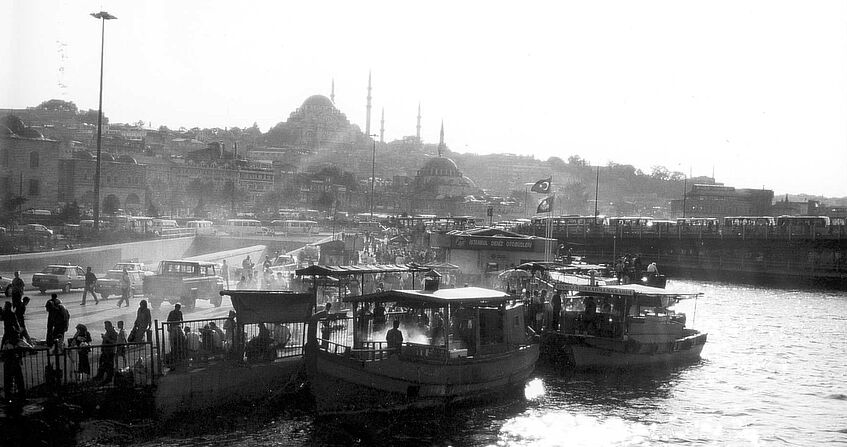History of Turkish Studies at the Department of Near Eastern Studies
Despite numerous lectures about the Ottoman Turkish language that were held in Vienna as early as the last quarter of the 17th century (but more prominently during the 1840s), Turkish Studies was not represented at the University of Vienna until the beginning of the 20th century, when it became part of the Oriental Institute (today, the Department of Near Eastern Studies), which was founded in 1886. One reason for this delay was certainly the existence of the “K.K. Academy of Oriental Languages,” which was founded by Maria Theresa in 1754, renamed the “Consular Academy” in the 19th century and, after its closure by the National Socialists, reopened as the “Diplomatic Academy” in 1964.
Even though the Wiener Zeitschrift der Kunde des Morgenlandes (WZKM), the journal founded by the Department, has published Turkology-related articles since its inception in 1887, it would take until the 1920s before a Chair in Ottoman Turkish studies was created, permanently establishing the discipline within the university setting. Starting in 1915-16, Friedrich v. Kraelitz-Greifenhorst (1876-1932) taught at the Department of Near Eastern Studies, becoming the first full professor of Turkish in 1923-24, a position he held until 1932. One of the fields of Kraelitz-Greifenhorst's work was Turkish philology, but he focused his attention on the editions and utilization of Ottoman documents in particular. He may be considered the founder of Ottoman Turkish diplomatics (i.e. the study of documents). His magnum opus is Osmanische Urkunden in türkischer Sprache aus der zweiten Hälfte des 15. Jahrhunderts. Ein Beitrag zur osmanischen Diplomatik (“Ottoman Documents in Turkish from the Second Half of the 15th Century: A Contribution to Ottoman Diplomatics”), published in 1921. It should not go unmentioned, however, that v. Kraelitz-Greifenhorst was part of a well-organized anti-Semitic network at the University of Vienna in the interwar period that drove Jewish and leftist researchers out of the University.[1]

Eminönü Port, Istanbul @ Yavuz Köse
It is also worth mentioning that Paul Wittek, who became well-known with his “Ghazi thesis,” contributed to the establishment of Ottoman Studies in Vienna during this period until 1924.
World War I brought numerous researchers into contact with allied Turkey, including Herbert Wilhelm Duda (1900-1975), who became full professor of Turkish and Islamic Studies in Vienna in 1943. Duda, who had signed the “Vow of Allegiance of the Professors of the German Universities and High-Schools to Adolf Hitler and the National Socialistic State” in 1933, had prevailed over Herbert Jansky, who had headed Turkish Studies between 1932 and 1943 (from 1940 on as a supernumerary professor), even though Jansky was considered politically faultless and more active by the National Socialist German Lecturers League.[2]
Duda and other Orientalists, who had previously believed they could save the Ottoman Empire alongside the German one, welcomed its disintegration in the 1920s and 193 0s. Duda, whose specialty was Ottoman Studies and Persian literature, also published works about contemporary Turkey. In 1948 he also devoted himself to “New Turkey” in his study Vom Kalifat zur Republik; die Türkei im 19. und 20. Jahrhundert (“From Caliphate to Republic: Turkey in the 19th and 20th Centuries”).

tea glass @ Yavuz Köse
Andreas Tietze, who was professor after Duda, also emigrated to Turkey in 1937, albeit under completely different circumstances than Duda. Tietze, who—like his parents, the art historians Hans Tietze and Erika Tietze-Conrat—was a political opponent of the rising fascism in society and supported the social democratic and socialist movements, emigrated to Turkey to escape the threat of racist persecution because of his Jewish ancestry. After working at the University of Istanbul and the University of California, Los Angeles for decades, Andreas Tietze became the professor of Turkish Studies at the University of Vienna in 1973 and taught as full professor of Turkish and Islamic Studies until 1984, where he was without a doubt the most famous local scholar of Turkish Studies, and he achieved the highest recognitions and was held in high esteem not only in Turkey but also in Europe and the USA.
Tietze’s research interests and work were wide-ranging, from linguistic aspects of the Turkish and Ottoman languages, to aspects of Ottoman-Turkish and Armeno-Turkish literature, to nautical vocabulary and Ottoman-Turkish historiography. He founded the Turkologischer Anzeiger (TA), a systematic bibliography for Turkish and Ottoman studies, with the renowned Hungarian Turkologist György Hazai. The core of his research in Vienna was a large-scale project that produced the lexical etymological dictionary of Turkish (Tarihi ve etimolojik Türkiye Türkçesi lugatı), the first volume of which was published during his lifetime (2002).
Anton Cornelius Schaendlinger, who succeeded Andreas Tietze as full professor in 1984 and held the professorship until 1991, specialized not only in Ottoman numismatics but also in Ottoman historiography, thus pursuing a subject area that Andreas Tietze himself had worked on intensively. Schaendlinger was most interested in Ottoman diplomatics and palaeography, however, completing numerous editions of Ottoman-Turkish documents from the Haus-, Hof- und Staatsarchiv in Vienna, thereby taking up the research field that had been established by Kraelitz-Greifenhorst and expanding it further. The intensive philological examination (following Tietze’s model) of Ottoman documents continues to this day, especially by Claudia Römer. In 2007, she and Gisela Procházka-Eisl published a volume titled Osmanische Beamtenschreiben und Privatbriefe der Zeit Süleymāns des Prächtigen aus dem Haus-, Hof- und Staatsarchiv zu Wien (“Ottoman Official Documents and Personal Letters from the Reign of Suleiman the Magnificent from the Haus-, Hof- und Staatsarchiv in Vienna”). It is no exaggeration to say that Viennese Turkology is a leader in the field of Ottoman diplomatics and has a strong reputation.
The study of political terminology in the broadest sense, already set forth in Kraelitz-Greifenhorst’s 1910 article “Parlamentarischen und verfassungsrechtlichen Ausdrücken im Osmanisch-Türkischen” (“Parliamentary and Constitutional Expressions in Ottoman Turkish”), has remained a research focus in Vienna even a century later, as the 2009 study on Herrschaft und Staat: Politische Terminologie des Osmanischen Reiches der Tanzimatzeit (“Rule and State: Political Terminology of the Ottoman Empire during the Tanzimat Period” by Heidemarie Doğanalp-Votzi and Claudia Römer impressively demonstrates.
Markus Köhbach, who was the professor of Turkish Studies from 1992 to 2017, continued the Turkological tradition that was shaped by Kraelitz-Greifenhorst, Duda, Jansky, Schaendlinger, and, of course, Andreas Tietze. His main focus was on Ottoman historiography, Habsburg-Ottoman relations, Ottoman intellectual history, as well as Ottoman philology and literature. Edith Ambros and Gisela Procházka-Eisl, with their focus on Ottoman and Turkish literature, also follow in Andreas Tietze’s footsteps. Tietze was not only concerned with Ottoman literature, but was also a passionate reader and a distinguished expert on contemporary Turkish literature, which he had published in the form of readers. Today, current research in literary studies is continuously complemented by cultural studies and cultural history studies on the Ottoman Empire and Turkey.
Since January 2019, with the appointment of Yavuz Köse to the professorship of Turkish Studies, the discipline’s areas of expertise have expanded: in addition to the social, economic, and cultural history of the Ottoman Empire, there is now a focus on contemporary Turkey.
The following works were used for this historical survey:
Ernst Dieter Petritsch, „Die Wiener Turkologie vom 16. bis zum 19. Jahrhundert“, in: Klaus Kreiser (ed.), Germano-Turcica. Zur Geschichte des Türkisch-Lernens in den deutschsprachigen Ländern. (Schriften der Universitätsbibliothek Bamberg 4). Universitätsbibliothek, Bamberg 1987, p. 25–40; Colin Heywood, „Wittek and the Austrian tradition”, Journal of the Royal Asiatic Society of Great Britain and Ireland (1988), p. 7–25; Sibylle Wentker, Das Studium der Orientalistik an der Universität Wien. Ein Beitrag zur Geschichte der Philosophischen Fakultät, Report. Vienna 2003; Helga Anetshofer, „‘Long Live Ottoman Studies‘. Erinnerungen an Andreas Tietze (1914-2003)“, TUBA 30/1 (2005), p. 315-350; Andreas Ekkehard Ellinger, Deutsche Orientalistik zur Zeit des Nationalsozialismus 1933-1945. Berlin 2006; Heinrich Pfusterschmid-Hardtenstein, Kleine Geschichte der Diplomatischen Akademie Wien. Ausbildung im Bereich der internationalen Beziehungen seit 1754. Diplomatische Akademie Wien 2008; Wolfdieter Bihl, Orientalistik an der Universität Wien. Forschungen zwischen Maghreb und Ost- und Südasien. Die Professoren und Dozenten. Vienna u.a. 2009; Claudia Römer, „Der ganze Orient: Zur Geschichte der orientalistischen Fächer am Beispiel einer internationalen orientalistischen Zeitschrift: Die Wiener Zeitschrift für die Kunde des Morgenlandes (WZKM) – VII. Die Turkologie in der WZKM“, in: Orientalische Landschaften. WZKM 100 (2010), p. 29-35; Balbous, Cécile, Das Sprachknaben-Institut der Habsburgermonarchie in Konstantinopel. Berlin 2015; Klaus Taschwer, „Geheimsache Bärenhöhle. Wie eine antisemitische Professorenclique nach 1918 an der Universität Wien jüdische Forscherinnen und Forscher vertrieb“, in Regina Fitz, Grzegorz Rossolinski-Liebe, Jana Starek (ed.), Alma Mater Antisemitica. Akademisches Milieu, Juden und Antisemitismus an den Universitäten Europas zwishen 1918 und 1938. Vienna 2016, p. 221-242; Gisela Procházka-Eisl, „Viyana’da Türkçe Öğgretiminin Tarihi, Dünü-Bugünü-Yarını“, Tuna 3 (2019), P. 5-7 (original „Viyana’da Türkçe öğretiminin tarihi, dünü-bugünü-yarını“, Orhon Yazıtlarının Bulunuşundan 120 Yıl Sonra Türklük Bilimi ve 21. Yüzyıl. Ankara, 2011. p. 681-689); Maas, Utz, „Tietze, Andreas“, (Verfolgung und Auswanderung deutschsprachiger Sprachforscher) zflprojekte.de/sprachforscher-im-exil/index.php/katalog-m-z/t/463-tietze-andreas (accessed 22.10.2019).
[1] Taschwer, "Geheimsache Bärenhöhle", p. 230.
[2] Ellinger, Deutsche Orientalistik, p. 179-180.
